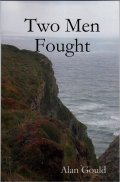
New edition,
now withdrawn
 New edition, now withdrawn |
The BookThe story is a domestic tragedy set in a group of Cornish villages on the south coast near Fowey and Truro. Jim Lavinet, son of a rabbit trapper, and Stephen Cornelly, son of a fisherman, start a feud as ten-year-olds that lasts through school, marriage, fatherhood and a failed business partnership, until they both die in an accident at sea. A notebook of Canning's contains a two-page outline, showing that the original title was "The Headland". There the main characters are identified simply as F and T, standing for Fisherman and Trapper, and the distrust of sea-going people for landsmen forms part of the tension. Nevertheless, Canning creates two memorable individuals in his protagonists. The descriptions of nature display love for and deep knowledge of this landscape. Although the place names are fictional, Canning was writing from real familiarity. The book shows Canning trying to do for Cornwall what Thomas Hardy does for Dorset or Emily Brontë for Yorkshire. In later "Alan Gould" books Canning also enters the literary worlds of Dostoyevsky and Conrad. |
BackgroundThis was the first of Canning's "Alan Gould" novels, published in 1936 by Collins instead of by Canning's regular publisher, Hodder and Stoughton. It is not clear why Canning adopted a pen-name and went to Collins at this stage of his career. It might have been that Hodder did not want more than one book a year from him. Canning took the pen-name from his mother's maiden name, but regularised the spelling from Goold to the commoner form of Gould. The book was published in March 1936 and was successful enough to have a second print run within the the first month. It attracted a glowing review from A.G.McDonnell in The Observer, and other positive reviews in The Scotsman and The Evening Standard. The first edition is extremely difficult to find on the second-hand market. |
ReviewComparisons and contrasts—Reviews of new novels by A.G.McDonnell, The Observer, 22 March 1936.
One of the greatest descriptions of masculine hatred, stupid,
irrational, unthinking, unnecessary, is Conrad’s seldom-quoted
story about the Napoleonic wars. The Duel is a masterpiece
in exactly the same that Flaubert’s last book (newly
translated, I see) is a masterpiece. It shows the supreme silliness
of mankind. And it also shows that men, though eternally children,
are also eternally a menace to the world. Can any woman, looking at
the pictures in the contemporary press of German soldiers
goose-stepping into Cologne, really believe any longer in the
doctrine of masculine image-of-Godness? Can any woman, contemplating
the dirt and grime of our modern industrial cities and the poor
stunted children, really think this globe is a perfect place where
men are proposing to spend all the money in the world and a lot more
on refurbishing guns and shells and the huge paraphernalia of death?
All this is leading up to the consideration of a most remarkable
first novel. |